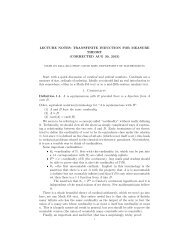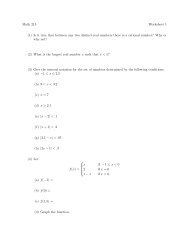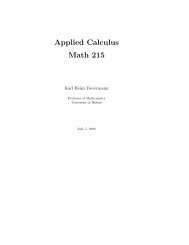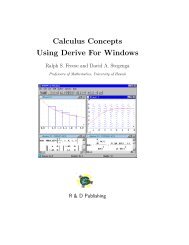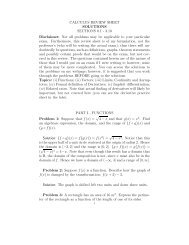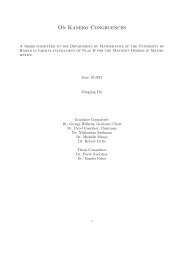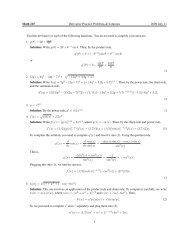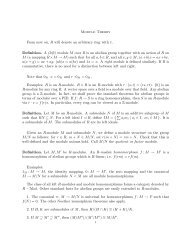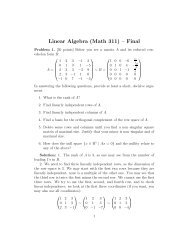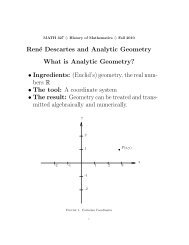Problems and Solutions in - Mathematics - University of Hawaii
Problems and Solutions in - Mathematics - University of Hawaii
Problems and Solutions in - Mathematics - University of Hawaii
Create successful ePaper yourself
Turn your PDF publications into a flip-book with our unique Google optimized e-Paper software.
1.1 1991 November 21 1 REAL ANALYSIS<br />
Let n > 0 be such that <br />
X\An<br />
|f| dm < ɛ/2.<br />
Def<strong>in</strong>e δ = (2n) −1 ɛ, <strong>and</strong> suppose E ⊂ [0, 1] is a measurable set with mE < δ. We must show | <br />
<br />
<br />
<br />
<br />
E<br />
<br />
<br />
f dm<br />
≤<br />
<br />
<br />
=<br />
<br />
≤<br />
E<br />
|f| dm<br />
(X\An)∩E<br />
X\An<br />
<br />
|f| dm +<br />
<br />
|f| dm +<br />
< ɛ/2 + n m(An ∩ E)<br />
< ɛ/2 + n ɛ<br />
= ɛ.<br />
2n<br />
An∩E<br />
An∩E<br />
|f| dm<br />
|f| dm<br />
E<br />
f dm| < ɛ.<br />
The penultimate <strong>in</strong>equality holds because |f| < n on An. ⊓⊔<br />
Pro<strong>of</strong> 2: 7 This pro<strong>of</strong> relies on the follow<strong>in</strong>g lemma about absolute cont<strong>in</strong>uity <strong>of</strong> measures:<br />
Lemma 1.1 Let ν be a f<strong>in</strong>ite signed measure <strong>and</strong> µ a positive measure on a measurable space (X, M). Then ν ≪ µ<br />
if <strong>and</strong> only if for every ɛ > 0 there is a δ > 0 such that |ν(E)| < ɛ whenever µ(E) < δ.<br />
The signed measure def<strong>in</strong>ed by<br />
<br />
ν(E) =<br />
is f<strong>in</strong>ite iff 8 f ∈ L 1 (µ). It is also clearly absolutely cont<strong>in</strong>uous with respect to µ. Therefore, lemma 1.1 can be<br />
applied to the real <strong>and</strong> imag<strong>in</strong>ary parts <strong>of</strong> any complex-valued f ∈ L1 (µ). It follows that, for every ɛ > 0, there is<br />
a δ > 0 such that<br />
<br />
<br />
|ν(E)| = <br />
<br />
<br />
<br />
f dµ <br />
< ɛ, whenever µ(E) < δ.<br />
E<br />
7. 9 Suppose f is a bounded, real valued, measurable function on [0, 1] such that x n f dm = 0 for n = 0, 1, 2, . . .,<br />
with m Lebesgue measure. Show that f(x) = 0 a.e.<br />
Solution: Fix an arbitrary cont<strong>in</strong>uous function on [0, 1], say, φ ∈ C[0, 1]. By the Stone-Weierstrass theorem, there<br />
is a sequence {pn} <strong>of</strong> polynomials such that φ − pn∞ → 0 as n → ∞. Then, s<strong>in</strong>ce all functions <strong>in</strong>volved are<br />
7 See also Foll<strong>and</strong> [4], page 89.<br />
8 For what follows we only need that ν is f<strong>in</strong>ite if f is <strong>in</strong>tegrable, but the converse is also true.<br />
9 This question appears very <strong>of</strong>ten <strong>in</strong> vary<strong>in</strong>g forms <strong>of</strong> difficulty. cf. November ’92 (7b, very easy version), November ’96 (B2, very easy),<br />
November ’91 (this question, easy), April ’92 (6, moderate), November ’95 (6, hard–impossible?). I have yet to solve the November ’95 version.<br />
One attempted solution (which I th<strong>in</strong>k is the one given <strong>in</strong> the black notebook), seems to assume f ∈ L 1 , but that assumption makes the problem<br />
even easier than the others.<br />
6<br />
E<br />
f dµ<br />
⊓⊔




